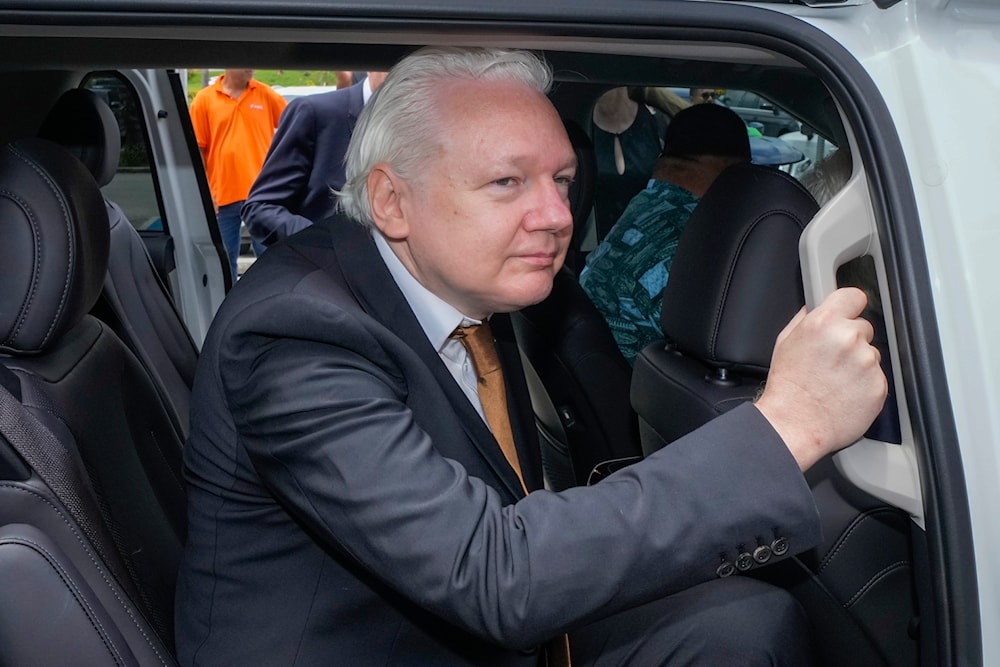Assange plea deal was the result of imminent US extradition failure
The Washington Post says no one has ever been found guilty under the Espionage Act for publishing government information.
-

WikiLeaks founder Julian Assange leaves the federal court in Saipan, Mariana Islands, Wednesday, June 26, 2024. (AP)
A warning message by a Justice Department attorney stationed in Europe on April 4 traveled to colleagues back home: it appeared that their five-year fight to extradite Julian Assange from the UK to the US would fail.
In an email reviewed by The Washington Post, the Justice Department trial attorney wrote, “The urgency here has now reached a critical point,” adding, “The case will head to appeal and we will lose.”
The Post revealed that after being forced to act, the US thwarted Assange's appeal request for an additional two months.
Lawyers working on the Assange case informed the higher-ups in December 2023 that something critical happened: Assange spent more time fighting extradition from Belmarsh prison than he would likely have received had he pled guilty in the United States.
In the plea deal, two things were non-negotiable for Assange, one being that he would not set foot in the continental United States, believing he would be charged with new crimes or shipped to military prison at Guantanamo Bay, Cuba, and the second was that if he pled guilty, his sentence would not surpass time already served in London’s Belmarsh Prison.
This comes as White House Press Secretary Karine Jean-Pierre clarified on Thursday that President Joe Biden is not considering pardoning the WikiLeaks founder.
"No, it’s not," Jean-Pierre stated during a press briefing in response to questions about the possibility of a pardon for Assange.
Assange's lawyers suggested that he accept a plea deal for a misdemeanor for mishandling sensitive material, which is possible to handle and try remotely via video as opposed to a felony – especially since during the leaks, the matter was only considered a misdemeanor and is now considered a felony.
The Post added that no one has ever been found guilty under the Espionage Act for publishing government information. The Obama administration never filed charges against Assange, and during the Trump administration, some federal lawyers in Virginia were against prosecuting him citing free speech.
As part of the plea deal, Assange would reveal what material WikiLeaks still had and where Assange had given them, via British or Australian middlemen. The Supreme Court declared that "foreign organizations operating abroad have no First Amendment rights" in a civil case from 2020.
Still, the highest court has ruled in prior cases that foreign nationals are not entitled to the same freedom of speech as US citizens – leading to the DoJ's warning of an imminent failure.
Read next: Georges Abdallah campaign salutes Assange, calls for former's release
One trial attorney said in an email that without the First Amendment, the UK lawyers representing the US concluded they would run into “an ethical obligation to drop the case” because of “their duty of candor,” meaning that they could no longer call for extradition when a condition required by the court had not been met.
The US then agreed that legal presence, not nationality, was the decisive factor in the First Amendment dispute. However, if that was the only reason the extradition had failed, it might have created a precedent for other foreign criminal targets to claim they were subjected to discrimination by being denied the same rights as Americans.
The United States assumed all risk as part of the plea. Thus, the Department of Justice chose the US territory of Saipan as the court and, consequently, the district judge, who was the only one present in the courthouse.
It is worth noting that Australian journalists are being asked by Assange's wife, Stella, to file freedom of information (FOI) requests with the US government to obtain details on its criminal case against him – as his plea deal prohibits him from doing so.

 4 Min Read
4 Min Read








